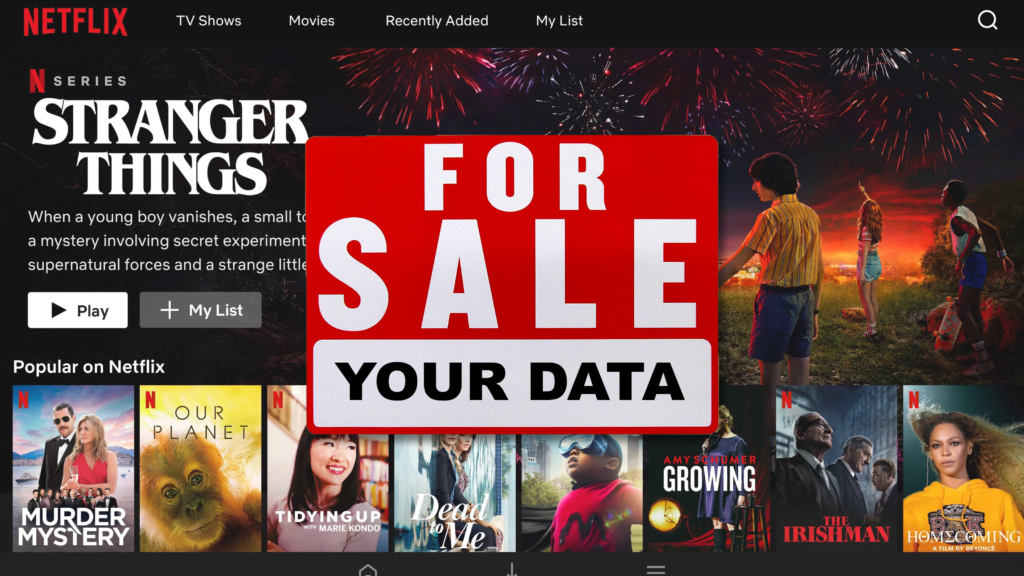Will Netflix be the TV Equivalent of Facebook?
06/16/2022

Netflix’s recent news about subscriber loss was a negative surprise for the company with a 200,000 subscriber deficit resulting in a 35% drop in stock price. Seemingly in response to that terrible news, Netflix began speaking more publicly about their upcoming plans for a lower-priced version that will include ads. While that new offering may be a win for consumer choice, consumers may not have a choice in how their data will be sold, shared and given away in such an offering. Netflix itself has a choice about how it will treat its enormous trove of consumer data: will it take the Facebook route and launch a new public consumer data bazaar, or will it take Apple’s approach which honors and respects consumers’ data privacy?
Why does this matter?
On the surface of it, you may think that your streaming TV history is pretty innocuous. But the enormous amount of consumer data across 200 million subscribers contains many elements that brands and advertising ecosystem vendors would be absolutely drooling to get a hold of:
- What you watch (all of it, including the shows you delete from your watched list!)
- Where you live
- Whether there are others that live with you
- Whether you have children, how many, and what they watch
- What kind of TV you have and how many TVs you have
- Your IP address(es) and information about the devices you use to watch Netflix
- How engaged you are in the content you watch (and where & when you are most engaged)
- Your payment / banking information
- Your phone number and email address
And then, there’s a LOT about what Netflix can infer about you. Things like:
- Your political affiliation
- Your sexual orientation
- Your religion
- The causes you believe in and support (think “documentaries”…)
- And many, many other inferences based on what you stream
Netflix could easily claim they wouldn’t be the first or only TV service to monetize your data. Most consumers aren’t aware of the fact that their TVs are already spying on them. TV manufacturers have found a lucrative source of high-margin revenue: YOU. Smart TVs collect similar sets of data that Netflix has, and this data is packaged and sold to programmatic bidders who use that data to track you and target ads to you while you are watching. And, other players are doing the same— Roku, Google’s YouTube TV service, and other OTT players are collecting and selling your data. In many ways, your TV has become very similar to your computer browser and has emerged as a newer channel for digital advertising. Have you ever wondered why TVs are getting bigger while prices have generally gotten lower? It’s because the TV manufacturers have found a new source of revenue and are willing to subsidize the TV costs to acquire more and more viewers, in order to unlock the revenue from your data.

Netflix Could Easily Become the New Facebook
Netflix could easily become the new Facebook and exploit its massive trove of consumer data, and there would be a compelling economic case to do so. Netflix would be able to generate a new and enormous revenue stream overnight by opening up their network to advertisers and adtech players, combined with a programmatic exchange fueled by your personal data. Advertisers would bid for the ability to serve an ad to you based on your private information. Along with this new auction would be enormous pressure for identity-based measurement. Brands will want to know definitively and deterministically whether it was you who saw their ad so they could match it to your identity in their purchase transaction data. And, buried deeply in the terms and conditions— which no consumer reads— will be the right for Netflix to do all of this and more. This movie has played out many times in the digital advertising ecosystem, and the consumer response has been consistently and resoundingly negative.
What is Netflix’s Alternative?
They could borrow a page from Apple’s playbook and disallow individual tracking and targeting while still generating substantial advertising revenue streams. They could even take Google’s pending TOPICS approach and use privacy-centric cohorts that allow advertisers to target ads based on general interests without allowing individual consumer targeting and tracking. These approaches would preserve individual privacy and would be a big win for consumers who are getting tired of their data being bought and sold without their control.
This is an important choice for Netflix, and certainly one they are debating internally as they plan their new ad-supported offerings. But the privacy world is watching, and consumers are starting to wake up to why privacy— or the lack of it— matters so much.
Want to learn more about privacy-forward marketing measurement? Contact OptiMine to learn how brands can measure their advertising performance using privacy-centric methods without PII or tracking.
Additional resources:
- “5 Marketing Attribution Tips to Protect Your Business” Blog Post
- “Attribution vs. Marketing Mix Modeling” Blog Post
- “Selecting a Marketing Attribution Tool” Blog Post
- “Marketing Attribution FAQ” Blog Post
- “What is Multi-Touch Attribution?” Blog Post
- “What is Incrementality in Marketing?” Blog Post
- “Your Marketing Measurement is Going Dark” Blog Post
- “Multi-Touch Attribution is Dead” eBook
- “4 Ways to Future-Proof Your Marketing Measurement” eBook
- OptiMine On-Demand Webinar: “The Measurement Dilemma: Navigating Privacy Driven Disruption”
- OptiMine x TickPick On-Demand Presentation: “ARF Measurement Challenges Showcase”

